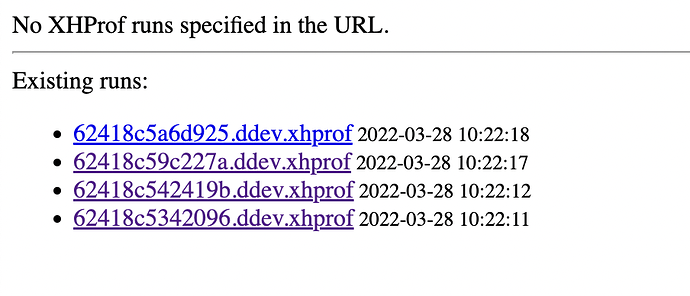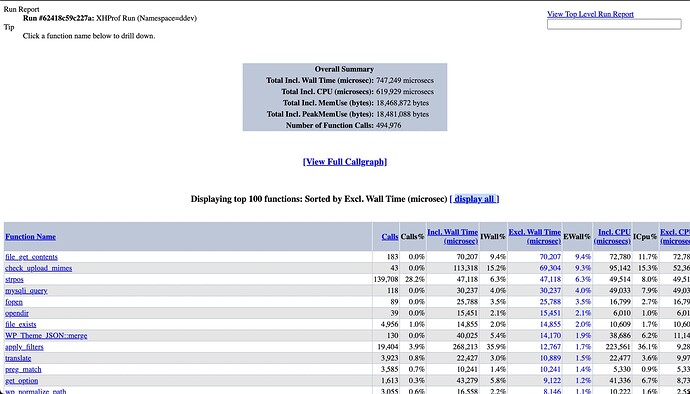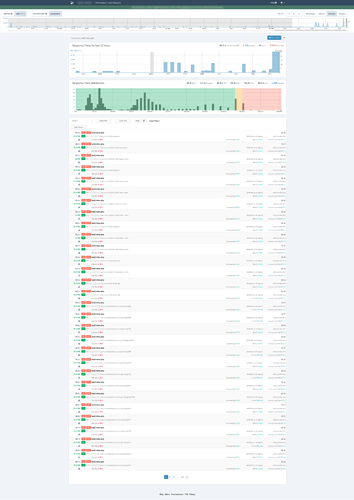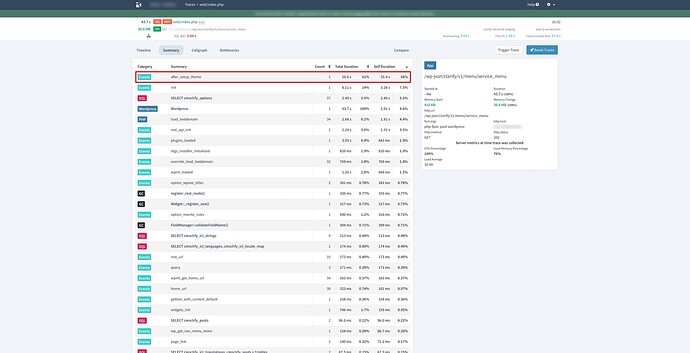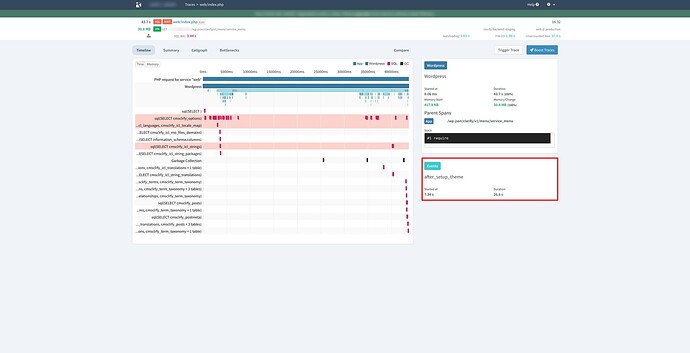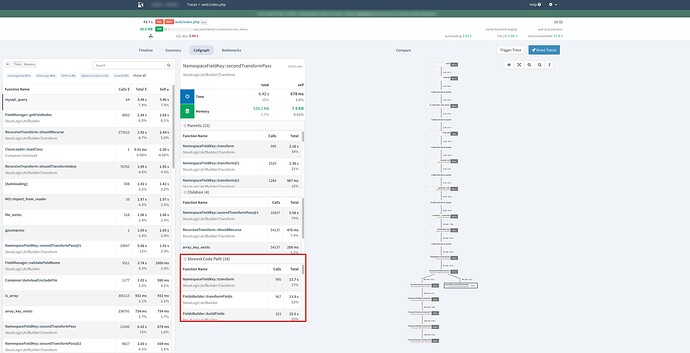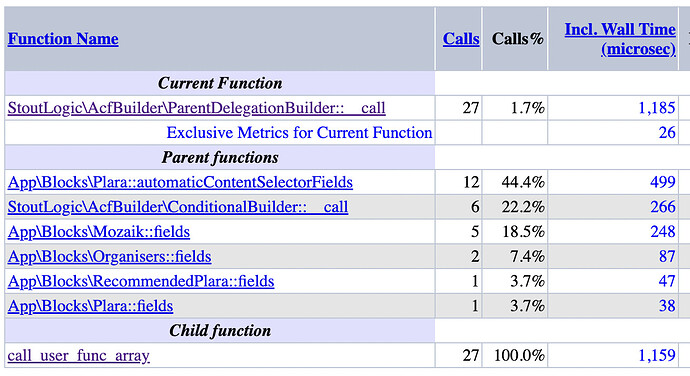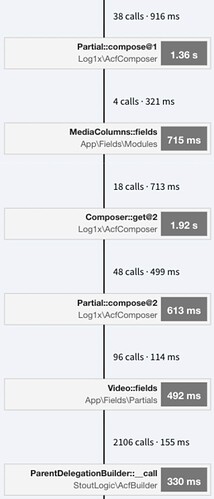- We’re running PHP 8.0.15 on the local & remote servers
- PHP opcache settings:
| Opcode Caching |
Up and Running |
| Optimization |
Enabled |
| SHM Cache |
Enabled |
| File Cache |
Disabled |
| JIT |
Disabled |
| Startup |
OK |
| Shared memory model |
mmap |
| Cache hits |
15787411 |
| Cache misses |
4270 |
| Used memory |
75550824 |
| Free memory |
58665824 |
| Wasted memory |
1080 |
| Interned Strings Used memory |
6290992 |
| Interned Strings Free memory |
0 |
| Cached scripts |
3186 |
| Cached keys |
5202 |
| Max keys |
7963 |
| OOM restarts |
0 |
| Hash keys restarts |
0 |
| Manual restarts |
0 |
| Directive |
Local Value |
Master Value |
| opcache.blacklist_filename |
no value |
no value |
| opcache.consistency_checks |
0 |
0 |
| opcache.dups_fix |
Off |
Off |
| opcache.enable |
On |
On |
| opcache.enable_cli |
On |
On |
| opcache.enable_file_override |
Off |
Off |
| opcache.error_log |
no value |
no value |
| opcache.file_cache |
no value |
no value |
| opcache.file_cache_consistency_checks |
On |
On |
| opcache.file_cache_only |
Off |
Off |
| opcache.file_update_protection |
2 |
2 |
| opcache.force_restart_timeout |
180 |
180 |
| opcache.huge_code_pages |
Off |
Off |
| opcache.interned_strings_buffer |
8 |
8 |
| opcache.jit |
tracing |
tracing |
| opcache.jit_bisect_limit |
0 |
0 |
| opcache.jit_blacklist_root_trace |
16 |
16 |
| opcache.jit_blacklist_side_trace |
8 |
8 |
| opcache.jit_buffer_size |
0 |
0 |
| opcache.jit_debug |
0 |
0 |
| opcache.jit_hot_func |
127 |
127 |
| opcache.jit_hot_loop |
64 |
64 |
| opcache.jit_hot_return |
8 |
8 |
| opcache.jit_hot_side_exit |
8 |
8 |
| opcache.jit_max_exit_counters |
8192 |
8192 |
| opcache.jit_max_loop_unrolls |
8 |
8 |
| opcache.jit_max_polymorphic_calls |
2 |
2 |
| opcache.jit_max_recursive_calls |
2 |
2 |
| opcache.jit_max_recursive_returns |
2 |
2 |
| opcache.jit_max_root_traces |
1024 |
1024 |
| opcache.jit_max_side_traces |
128 |
128 |
| opcache.jit_prof_threshold |
0.005 |
0.005 |
| opcache.lockfile_path |
/tmp |
/tmp |
| opcache.log_verbosity_level |
1 |
1 |
| opcache.max_accelerated_files |
4000 |
4000 |
| opcache.max_file_size |
0 |
0 |
| opcache.max_wasted_percentage |
5 |
5 |
| opcache.memory_consumption |
128 |
128 |
| opcache.opt_debug_level |
0 |
0 |
| opcache.optimization_level |
0x7FFEBFFF |
0x7FFEBFFF |
| opcache.preferred_memory_model |
no value |
no value |
| opcache.preload |
no value |
no value |
| opcache.preload_user |
no value |
no value |
| opcache.protect_memory |
Off |
Off |
| opcache.record_warnings |
Off |
Off |
| opcache.restrict_api |
no value |
no value |
| opcache.revalidate_freq |
60 |
60 |
| opcache.revalidate_path |
Off |
Off |
| opcache.save_comments |
On |
On |
| opcache.use_cwd |
On |
On |
| opcache.validate_permission |
Off |
Off |
| opcache.validate_root |
Off |
Off |
| opcache.validate_timestamps |
On |
On |
PHP realpath settings:
realpath_cache_size => 4096K => 4096K
realpath_cache_ttl => 120 => 120
- Not sure if the average process is actually ~30 Mb. When I log the backend with
htop and do a frontend refresh I can see lots of php-fpm processes coming in and maxing out the CPU, which was the reason to start this thread:
CPU[||||||||||||||||||||||||||||||||||||||||||||||||||||||||||||||||||||||||||||||||||||||||||||||||||||||||||100.0%] Tasks: 77, 61 thr; 1 running
Mem[||||||||||||||||||||||||||||||||||||||||||||||||||||||||||||||||||||||||||||||| 1014M/1.94G] Load average: 5.21 2.78 2.78
Swp[|||||| 49.8M/954M] Uptime: 10 days, 18:24:58
PID USER PRI NI VIRT RES SHR S CPU% MEM% TIME+ Command
153186 web 20 0 252M 98372 72500 R 6.2 4.8 0:01.35 php-fpm: pool wordpress
153188 web 20 0 251M 96428 71196 R 6.2 4.7 0:01.22 php-fpm: pool wordpress
153190 web 20 0 249M 96372 71504 R 6.2 4.7 0:01.21 php-fpm: pool wordpress
153184 web 20 0 249M 96352 71504 R 6.2 4.7 0:01.23 php-fpm: pool wordpress
153181 web 20 0 251M 95700 70608 R 6.2 4.7 0:01.20 php-fpm: pool wordpress
153327 web 20 0 247M 73664 53600 R 6.2 3.6 0:00.12 php-fpm: pool wordpress
153328 web 20 0 245M 72592 53600 R 6.2 3.6 0:00.12 php-fpm: pool wordpress
153329 web 20 0 247M 73644 53600 R 6.2 3.6 0:00.12 php-fpm: pool wordpress
153343 web 20 0 239M 58732 46104 R 6.2 2.9 0:00.05 php-fpm: pool wordpress
153173 web 20 0 251M 95724 70632 R 0.0 4.7 0:01.22 php-fpm: pool wordpress
153192 web 20 0 249M 96308 71504 R 0.0 4.7 0:01.23 php-fpm: pool wordpress
153189 web 20 0 249M 96364 71504 R 0.0 4.7 0:01.23 php-fpm: pool wordpress
153183 web 20 0 249M 96356 71504 R 0.0 4.7 0:01.22 php-fpm: pool wordpress
153182 web 20 0 251M 96420 71196 R 0.0 4.7 0:01.22 php-fpm: pool wordpress
153185 web 20 0 251M 96628 71504 R 0.0 4.8 0:01.21 php-fpm: pool wordpress
153180 web 20 0 249M 96300 71504 R 0.0 4.7 0:01.20 php-fpm: pool wordpress
153326 web 20 0 249M 76640 54520 R 0.0 3.8 0:00.15 php-fpm: pool wordpress
153334 web 20 0 241M 66132 50636 R 0.0 3.3 0:00.08 php-fpm: pool wordpress
153337 web 20 0 241M 66216 50700 R 0.0 3.3 0:00.08 php-fpm: pool wordpress
153324 web 20 0 249M 80252 57460 R 0.0 4.0 0:00.19 php-fpm: pool wordpress
153330 web 20 0 247M 73908 53600 R 0.0 3.6 0:00.12 php-fpm: pool wordpress
153336 web 20 0 241M 66200 50700 R 0.0 3.3 0:00.08 php-fpm: pool wordpress
153339 root 20 0 239M 58720 46104 R 0.0 2.9 0:00.05 php-fpm: master process (/etc/php/8.0/fpm/php-fpm.conf)
153341 root 20 0 239M 58720 46104 R 0.0 2.9 0:00.05 php-fpm: master process (/etc/php/8.0/fpm/php-fpm.conf)
153177 web 20 0 251M 96812 71488 R 0.0 4.8 0:01.24 php-fpm: pool wordpress
153191 web 20 0 251M 96608 71504 R 0.0 4.8 0:01.23 php-fpm: pool wordpress
153332 web 20 0 241M 65864 50508 R 0.0 3.2 0:00.08 php-fpm: pool wordpress
153333 web 20 0 241M 66220 50700 R 0.0 3.3 0:00.08 php-fpm: pool wordpress
Since the logs displayed a suggestion:
[pool wordpress] server reached pm.max_children setting (10), consider raising it
We increased the max_children to 40, do you think this is too hight now?
I also noticed the VIRT column never exceeds the 256M while the memory_limit is set to 512M?
- Yes the frontend as well as the backend are both DO droplets:
Frontend Docker: 1 GB / 1 vCPU
Backend Trellis: 2 GB / 1 AMD vCPU
Could the AMD processors somehow be causing any of these issues?
Only the frontend is running in a docker container without php, just node.
We did try increasing the production droplet to: 2 GB / 2 AMD vCPUs and it did solve the problem slightly, but the CPU still spikes to 100% on both on a simple frontend page load.
- No there definitely aren’t 5511 fields, more like 50 or so.
I think the big difference is that we’re using our Sage 10 theme only as an API provider with tools like acf-composer & poet.
On a frontend page load, multiple REST API request are made (at least 5, but could be 10) and we can see those are clogging up the memory and response times, the first request is ok, 2nd is already slower and 3rd one even more.
Basically on every API request the \Roots\bootloader is trying to load the Laravel framework, which for us, is only required so we can use acf-composer & poet.
Could that be the cullprit?
Thanks!
